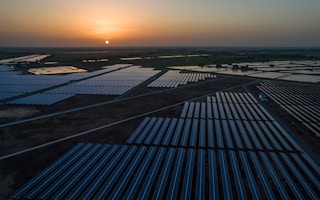Local authorities will carve out a larger role in fighting rising temperatures globally, as national governments have been slow to take action, said organisers of a climate change summit beginning on Wednesday in San Francisco.
About 4,500 delegates from the city and regional governments, as well as industries and research institutions, will attend the Global Climate Action Summit, which was put together by Californian authorities and the United Nations.
The three-day gathering will deepen the leadership of sub-national authorities in curbing climate change, a battle that almost 200 nations have also joined under the Paris climate accord, according to organisers.
“We’re moving into a new wave, a new phase of stepped up climate action,” said summit spokesman Nick Nuttall, adding that the event is expected to yield joint pledges to limit temperature increases.
The gathering reflects a desire to bypass the slow progress of national governments in implementing Paris agreement goals, said Michael Burger, executive director of the Sabin Center for Climate Change Law at New York’s Columbia University.
“
We are late, and we have to accelerate our efforts to reduce emissions.
Jerry Brown, governor, California
The Paris pact aims to limit the rise in global temperatures to well below 2 degrees Celsius (3.6 Fahrenheit), and ideally to 1.5 degrees Celsius, with a sweeping goal of ending the fossil fuel era this century.
The agreement is due to come into force in 2020. But negotiations over how to roll out the treaty have exposed disagreements about funding for developing countries.
This week’s summit in California is heavy with symbolism, as the United States is the only country to announce its intention to withdraw from the Paris pact, following a decision by US President Donald Trump last year.
“It can be and should be seen as a response to the abdication of leadership by the US federal government, which has really created a vacuum for leadership,” Burger told the Thomson Reuters Foundation.
The gathering follows a summer marked by mounting signs of a rapidly warming atmosphere. Record heatwaves and wildfires this summer have been linked to above-normal temperatures worldwide.
‘Accelerated efforts’
Local government administrators are expected to announce initiatives about electric vehicles and forest conservation, while companies will likely pledge to roll back greenhouse gas emissions, Nuttall said.
National governments from more than a dozen countries, including China and Britain, are also sending representatives. China’s presence is to be particularly heavy, and it will have its own pavilion on the sidelines of the gathering.
China is the world’s largest emitter of greenhouse gasses, followed by the United States, according to the World Resources Institute, a Washington D.C.-based research organization.
Chinese officials saw the meeting as a way to “make real progress” outside of political circles in Washington, said Daniel Sperling, a professor of environmental sciences at the University of California, Davis.
“They like very much working with us in California because it’s below the radar: it’s not White House politics,” said Sperling, who is also a member of the California Air Resources Board, the state’s clean air regulator.
California’s governor, Jerry Brown, defied the US government’s retreat from the Paris pact by branding it “insane”, and immediately flying to China to foster greater cooperation on clean energy.
The gathering, Brown said in a phone interview, was not designed to sway Trump’s opinion on climate change.
But he said he hoped it would awaken other members of the Republican Party to the “existential threat” of global warming and to its economic potential, ahead of a US mid-term general election to be held in November.
“We are late, and we have to accelerate our efforts to reduce emissions,” he said.
Policies encouraging bus transportation, green buildings and clean energy could generate 14 million jobs in cities globally by 2030, offsetting job losses in the energy industry, according to a report this week by C40, a network of large global cities.
This story was published with permission from Thomson Reuters Foundation, the charitable arm of Thomson Reuters, that covers humanitarian news, women’s rights, trafficking, property rights, climate change and resilience. Visit http://news.trust.org.










